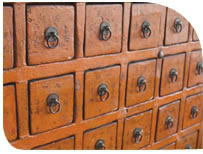 It is hot and humid in summer. Heat vaporizes the moisture and spreads dampness into the air leading to mists and fogs. High temperature and dampness are "the prevalent climatic evils" in summer as known in Chinese Medicine. During this period, the body is the most at risk from the attack by dampness; and indulgence in cold food and drink impedes digestive function and causes disturbance of "Qi" circulation. Remarkable symptoms include feeling of distention in head, tiredness, sleepiness, heaviness of limbs, poor perspiratory, chest distress, greasy taste in mouth, stiffness and pain in joints, itch, blister, edema, increase of vaginal discharge, poor appetite, epigastic distention, diarrhea, loose stool, tongue with a white or yellow greasy coating, etc.
It is hot and humid in summer. Heat vaporizes the moisture and spreads dampness into the air leading to mists and fogs. High temperature and dampness are "the prevalent climatic evils" in summer as known in Chinese Medicine. During this period, the body is the most at risk from the attack by dampness; and indulgence in cold food and drink impedes digestive function and causes disturbance of "Qi" circulation. Remarkable symptoms include feeling of distention in head, tiredness, sleepiness, heaviness of limbs, poor perspiratory, chest distress, greasy taste in mouth, stiffness and pain in joints, itch, blister, edema, increase of vaginal discharge, poor appetite, epigastic distention, diarrhea, loose stool, tongue with a white or yellow greasy coating, etc.
During high humidity seasons, we should pay attention in daily life to lower the accumulation of dampness in our body. Necessary precautions include:
- Keep the room in good ventilation, optimize the indoor climate with air-conditioners and dehumidifiers;
- Exercise with much sweating is preferred; it can help to relieve fatigue and increase appetite (avoid doing exercise at noon and under sick condition);
- Choose fruits or cold drinks wisely;
- Have more healthy drinks which are good for dampness and heat expel from our body, uretic.
In summer, people with endogenous dampness are prone to have heat stroke. Under extreme heat, high humidity and poor ventilated condition, those who are weak, elderly, pregnant, overweight, and those who have chronic disease, sleep disorder and fatigue may also face increased risk of heat strokes. The body may not be able to dissipate the heat which subsequently causes the body temperature to rise leading to heat stroke. For mild cases, have congee that strengthens the spleen or increases urination for expelling dampness and heat; accompanied with "Gua Sha" (spooning) can also help. For serious cases, consultation would be suggested.
The above information is for reference only. If you have any enquiries, please consult registered Chinese Medicine Practitioner for details.
Source: Dr. Zhang Hong Xia, Lecturer II of Clinical Division
School of Chinese Medicine, Hong Kong Baptist University











 Expel dampness in Summer
Expel dampness in Summer
